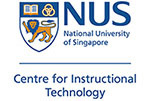 Dr Lim Kwang Hui is an Assistant Professor in the Business Policy Department of the NUS Business School. Dr Lim is a receipient of the Annual Teaching Excellence Awards 2003/2004. He uses IVLE, the Plagiarism Detection Service and other technologies to enhance teaching and learning in the NUS Business School.
Dr Lim Kwang Hui is an Assistant Professor in the Business Policy Department of the NUS Business School. Dr Lim is a receipient of the Annual Teaching Excellence Awards 2003/2004. He uses IVLE, the Plagiarism Detection Service and other technologies to enhance teaching and learning in the NUS Business School.
Tell us a bit about yourself and your work in NUS.
My area of work is the management of innovation and entrepreneurship. I teach an undergraduate course on managing innovation for the NUS Entrepreneurship Centre Technopreneurship program, as well as two MBA courses. As for my research, it is on the strategies used by firms to manage their knowledge and intellectual property.
When and how did you get to know about IVLE?
I learnt about IVLE almost as soon as I joined NUS. I believe one of my colleagues told me about it.
What do you like most about IVLE? Which features do you use?
The best thing about IVLE is its simple interface. Behind the scenes, the software takes care of many complex tasks but this is well-hidden away from the end user; a few simple mouse-clicks gets them what they want. Among the features that I use are the eReserves, forum, multimedia videos, surveys and workbins. All of these are very useful when I teach a class.
I also use the Project Tool which is amazing for assigning students randomly into groups and then managing these group projects. It also allows students to conduct peer reviews of each other. About the only features I do not use are the chat room and gradebook.
Has IVLE changed your teaching style? If so, how has it changed your teaching style?
Definitely. For one thing, I no longer use a textbook, relying on the IVLE eReserves instead to distribute articles for the students to read. This way, I no longer have to worry about how many copies of textbooks to order each semester, plus I get to use the best readings in each area. No textbook is fantastic from cover to cover, so by carefully selecting articles and cases, I can put together a package that is of better quality for the students. Another important tool is the IVLE Forum. It allows me to offload a lot of subsidiary discussions out of the classroom, so that I can concentrate on making the in-class experience much more interactive and fun.
Another aspect of the Forum that is wonderful is that it allows students to discuss and debate topics with each other, including students who are shy in class. But, for the Forum to work, it is very important that I spend the first session of each semester laying the groundwork so that students are not afraid to make mistakes and to speak their mind. Once that is in place, you will be amazed how articulate and thoughtful our students can be.
What is the response of your students towards IVLE?
You have to ask them. At least from the feedback that I've received, they seem quite positive about it.
We gather that you use the Plagiarism Detection Service. How useful is this service to you and your students?
The Turnitin service that you refer to is extremely useful. I use it in every class I teach. It is important that students complete their own assignments, otherwise they will not really learn from the class. Also, if I allow some students to get away with plagiarism, this will be unfair to the others. The Turnitin software is very powerful, and I have caught a number of students for plagiarism using it. Unfortunately, the software has a poor user interface and unless this improves, many professors will be deterred from using it. By the way, I have put together a FAQ on plagiarism. It includes actual emails from students as well as my responses. I put this FAQ together because I believe students learn better through examples than if I gave them a long list of rules.
You are conversant with technology, dealing with technology in your academic papers. You also enjoy digital photography and computers. Besides IVLE and the Plagiarism Detection Service, how else have you applied technology in teaching and learning?
I am a believer that one should use technology where appropriate, not blindly. The technology I use include: videoclips, webcasts Powerpoint and Macromedia Breeze. But none of this should get in the way of the in-class experience. I also take lots of digital photographs of my students which get distributed on IVLE (this allows them to quickly form bonds with their classmates).
For MBA and PhD students, I conduct a number of computer laboratory sessions during which they run simulation models of R&D competition and investment. At the end of every semester, I create a life-long mailing list for my students using yahoogroups, and this allows them to keep in touch with each other and with me long after their class has ended. This also becomes a valuable resource in their lifelong learning experience because I occasionally send them updates, suggestions on books and articles to read, as well as relevant seminar announcements. Apart from this, I am the Principal Investigator for the NUS Patent Database project. This is a large database of patents that is being used for research, but we also actively use it for training Ph.D and Masters students, as well as for short executive programs. I am quite pleased with the impact of this project, which is starting to be used by others in Europe, Australia and USA.

